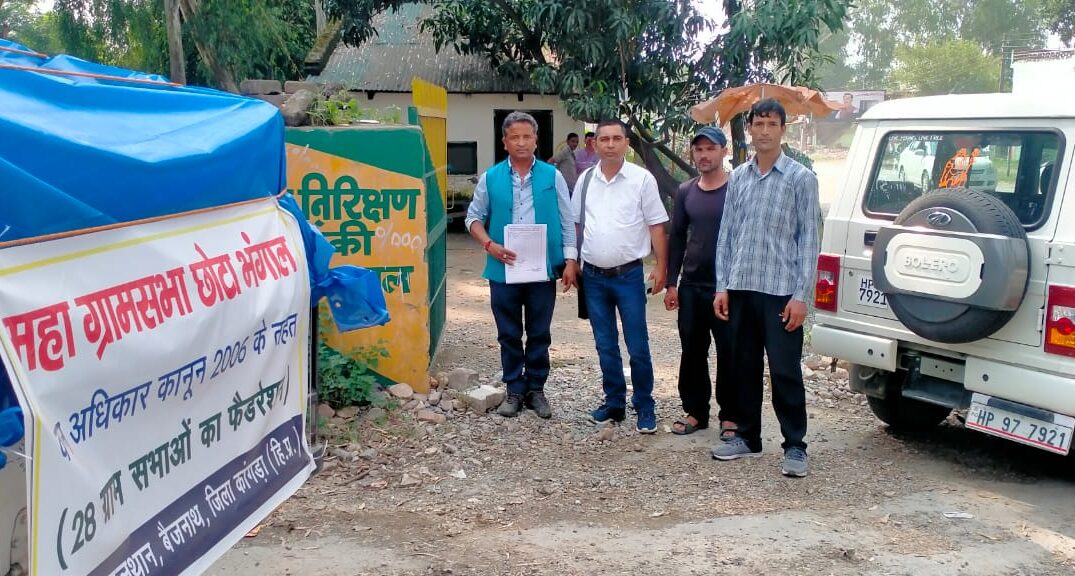The first milestone towards building forest economy in the state of Himachal Pradesh

Sustainable and regulated harvesting of forest products is essential for forest conservation. To ensure the forest products are not depleted, and the communities depending on the SFPs (Seasonal Forest Products) maintain a consistent and balanced supply of raw material to the industry and markets, the Chhota Banghal Maha Gram Sabha (CBMGS) prepared for regulated harvesting mechanisms through management planning. 28 Gram Sabhas submitted management plans as required by the Forest Rights Act. Instead of including all forest resources, the CBMGS decided to restrict the management plans to the extraction and collective sale of medicinal plants. These plans include collecting information on the biogeography of medicinal plants in the landscape, the harvesting cycles, and decided on patterns for extraction.
In the absence of Community Forest Resource rights (CFR), there was no system to support the collective sale of Seasonal Forest Products. The collectors of SFPs sold the forest products to local traders, who were granted export permits by the Forest Department. After receiving titles on their forest land, the MGS was determined to establish a legal and transparent process for the collective sale of medicinal plants. According to the Forest Rights Act, the collectors are free to sell forest products outside the forest division, individually or collectively, after procuring a transit permit from the Maha Gram Sabha (MGS). After the recognition of CFR rights, the authority of issuing transit permits is transferred from the Forest Department to the Maha Gram Sabha. The initial efforts of the CBMGS to clarify this section of the Act with the Forest Department and the District Collector were faced with roadblocks. It is important to note here that such a feat is unprecedented in Himachal Pradesh. Chhota Banghal is the first landscape in Himachal Pradesh to receive community titles on forest lands. Although there was consensus among the representatives of the forest department and the district administration regarding the position of the Maha Gram Sabha as the official issuer of transit permits, they were hesitant to declare their approval officially.
After frequent and long discussions backed with the necessary clarifications, the Maha Gram Sabha decided to proceed with the first sale. The MGS was focused on two other aspects: preparing the management institution to conduct business, and market exploration in parallel with discussions with government stakeholders. In March 2022, the leadership of MGS visited markets in Amritsar to strike deals with traders of valuable medicinal plants. This was followed by a roundtable on boosting the forest economy in Himachal Pradesh, organized collaboratively by ISB and Government of Himachal Pradesh. A few select traders from the Amritsar market ‘Majith Mandi’ were invited to the roundtable to discuss the present and future opportunities in the forest economy. The traders were thrilled to learn that in the new and enhanced system of collective sale that builds on the Community Forest Resource Rights framework, the MGS is responsible for meeting the legal requirements of large sales. This includes invoice, GST number or e-way bill as required. Post the roundtable, ISB connected these exporters to the MGS for price negotiation of Kadu, a seasonal forest product harvested in the month of September.
With the support from ISB, the MGS acquired a PAN card, GST number, and designed the transit permit. The team sought required approvals from FD, met with the DFOs to ensure that the rangers at the check post record the transit permit and details of the products being transported outside the division. Since there are two check posts between Chhota Banghal and Amritsar, the team interacted with the DFOs of both divisions to inform them about the collective sale.
The IoFE team at BIPP ISB worked with MGS to prepare the management plans and meet the legal requirements for the sale. The representatives of the MGS along with the BIPP ISB team met bank officials, the Sub District Magistrate (SDM) who is also the chairman of the Sub-Divisional Level Committee (SDLC) for support on the paperwork required to register for a PAN card in the name of MGS. The team took guidance from the Maha Gram Sabha in Gadchiroli, Maharashtra, who previously acquired the transit permit for collective sale of forest products. The MGS designed a transit permit to issue to the Gram Sabhas involved in the collective sale.
In order to transport four quintals of Kadu, neither did they have access to a commercial vehicle, nor was any transport company willing to transport the FP (forest products). In the end, the Vice President of CBMGS loaned his commercial vehicle for the sale. The MGS and IoFE team anticipated resistance from the FD at the two check posts on the way to Amritsar. The team studied the check post regulations and printed out the transit permit issued by MGS. We mobilized volunteers, including lawyers, activists, federation members, and GS members, who gathered at the first check post to support and resolve any issues.
Contrary to our expectations, everyone was pleasantly surprised by the officials’ support at both the check-posts. The post-sale processes of tax invoicing, permit submissions, and cheque payments went seamlessly at Amritsar.
Since there are delays in processing payments, we are planning to digitize multiple processes in the value chain, wherever it is possible to facilitate ease in transacting. This includes processes concerning GST payments, transport challan, and cash distribution to the members. BIPP ISB is working towards developing smartphone applications for issuing collection permits to the collectors, maintain stock registers, and record the financial transactions of institutions.
